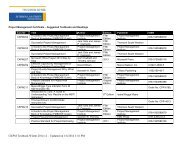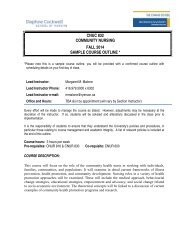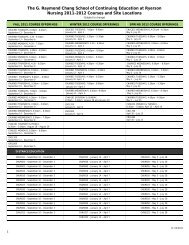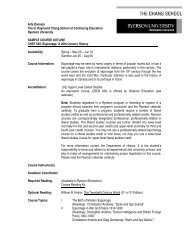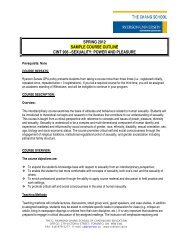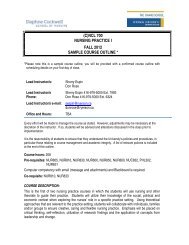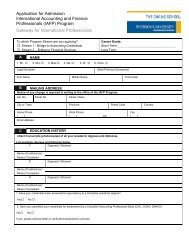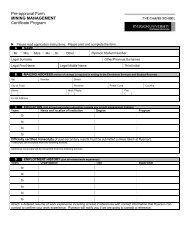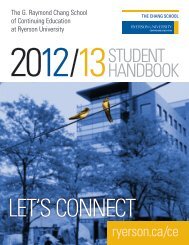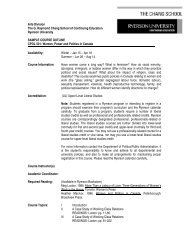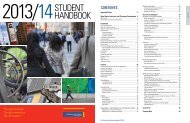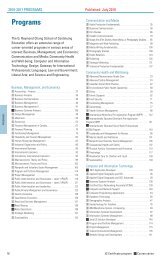CHST 503 - The Chang School - Ryerson University
CHST 503 - The Chang School - Ryerson University
CHST 503 - The Chang School - Ryerson University
- No tags were found...
You also want an ePaper? Increase the reach of your titles
YUMPU automatically turns print PDFs into web optimized ePapers that Google loves.
Arts Division<strong>The</strong> G. Raymond <strong>Chang</strong> <strong>School</strong> of Continuing Education<strong>Ryerson</strong> <strong>University</strong>SAMPLE COURSE OUTLINE<strong>CHST</strong> <strong>503</strong>: Crime and Punishment in 20th Century CanadaAvailability: Fall – Sep 11 – Dec 11Spring – May 05 – Jun 16Course Information:Accreditation:This course is a historical inquiry into crime and punishment in 20 th -centuryCanada. <strong>The</strong> major focus of the course is an examination of the social history ofcrime; which includes historical attitudes toward crime, definitions of what actionsconstitute criminal behaviour and how they change over time, and finally, theevolution of the relationship between the criminal justice system and socialchange.(UL) Upper Level Liberal Studies.An equivalent course, COCR 932, is offered By Distance Education (seecalendar)Note: Students registered in a <strong>Ryerson</strong> program or intending to register in aprogram should examine their program’s curriculum and the <strong>Ryerson</strong> calendarcarefully. To graduate from a program, students require a number of liberalstudies credits as well as professional and professionally related credits. <strong>Ryerson</strong>courses are correspondingly designated professional, professionally-related orliberal studies. <strong>The</strong> liberal studies courses are further divided into lower-level(normally for first and second year credit) and upper-level (normally for third andfourth year credit) courses. You may not use a professionally-related psychologycourse for a liberal studies credit or vice versa, nor may you use a lower-levelliberal studies course for upper-level liberal studies credit.For more information contact the Department of History. It is the student’sresponsibility to know and adhere to all departmental and university policies, andalso to make all arrangements for maintaining proper registration in this course.Please read the <strong>Ryerson</strong> calendar carefully.Course Instructor(s)Academic Coordinator:Required Reading:(Available in <strong>Ryerson</strong> Bookstore)Course Reading KitReadings on Reserve at <strong>Ryerson</strong> LibraryCourse Topics: I IntroductionII Aboriginal Justice and Colonization(Readings – Tina Loo “Toronto’s Due Law: Law Culture andColonization in British Columbia – kit; Reserve Readings #1)III Frontier Crime and Justice
IVVVIVIIVIIIIXXXIX(Reading – Susan Lewthwaite – “Violence, Law and Community inRural Upper Canada – kit; Reserve reading #2)Emergence of the Penitentiary(Readings – C.J. Taylor, “<strong>The</strong> Kingston, Ontario Penitentiary and MoralArchitecture – kit; Reserve Reading #3)Policing(Readings: Nicholas Rogers “Serving Toronto the Good” – kit; ReserveReading #4)Crime Trends 18 th -20 th Centuries(Readings – Helen Boritch “Crime and Punishment in Middlesex County– kit; Reserve Reading #5)Moral Reform and Sexual Regulation(Readings – Lon Rotenberg “<strong>The</strong> Wayward Worker” – kit; ReserveReading #6 &7)Gender and the Law: <strong>The</strong> Legal Regulation of Reproduction(Readings –Susanne Klausen “Doctors and Dying Declarations” - inclasshandout; Reserve Reading #7)Women’s Prisons(Readings – Carolyn Strange “<strong>The</strong> Criminal and Fallen of <strong>The</strong>ir Sex –kit;Reserve Reading #3}Juvenile Delinquency(Readings – Paul Bennett “Turning Bad Boys into Good Citizens” – kit;Reserve Reading #9)Criminal Insanity(Readings – Robert Menzies “<strong>The</strong> Making of Criminal Insanity in BritiishColumbia” – kit; Reserve Reading #.8)Penal Reforms in the 20 th Century(Readings –David Sichor “Private Prisons in Perspective”)Assignments & Exams Assignment #1 – 15%, Assignment #2 – 35%, Final Exam 35%,Attendance/Participation – 15 %NOTE: Planned alterations in the list of course assignments, tests, approximatedeadlines and in the marking or evaluation scheme, as they appear in the courseoutline shall be discussed in class prior to being implemented.<strong>CHST</strong> <strong>503</strong>: Crime and Punishment in 20 th Century Canada / 2



